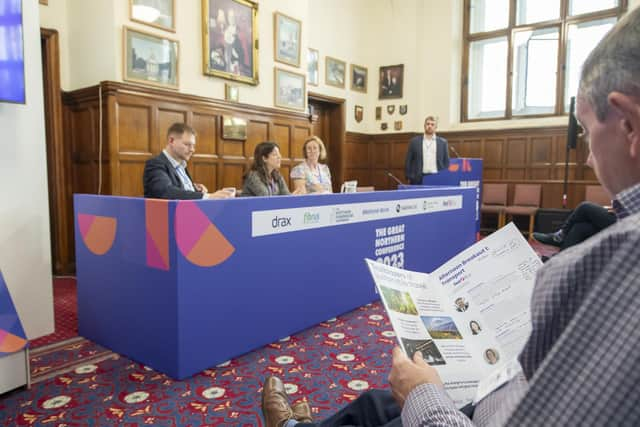'Promote Yorkshire's public transport initiatives better', Great Northern Conference hears
Speaking during the Transport session at the Great Northern Conference, Martijn Gilbert, Managing Director of Lumo and Hull Trains, said there is a “fundamental difference” between how services are overseen and funded in London and the rest of the country.
“London receives more funding for bus services than the rest of England put together. Now Manchester is receiving some substantial additional funding through devolution which is enabling them to do franchising, so you can have these things, but there is a cost to them.
Advertisement
Hide AdAdvertisement
Hide Ad“But I think the other big difference in London is that is that Transport for London as a body control all the highway infrastructure as well. So back to my points about the things that really upset the quality of services that really affect users, such as congestion, space allocation, car parking costs, all that sort of thing; TfL have control over that and they’re able to align it into a focused model, and then the final piece is tickets.”


However, Mr Gilbert also pointed out to the existence of the West Yorkshire Metro ‘M card’, which is a system that allows public transport users within West Yorkshire to seamlessly transfer across the public transport network within West Yorkshire. He said: “That’s the big thing that people speak up mostly because they want some form of simplified ticketing, and it upsets me sometimes that we’re not very good at celebrating already got.
“Eleven years ago, I stood outside of Leeds station with an ‘M card’ smartcard to celebrate what is in fact West Yorkshire’s version of an Oyster card.”
The West Yorkshire Metro is the travel network for West Yorkshire Combined Authority, and incorporates all buses and trains within West Yorkshire. The ‘M card’ is a smartcard, similar to London’s Oyster card, which allows passengers to use a single ticket on buses and trains.
Advertisement
Hide AdAdvertisement
Hide AdLondon-style transport systems are starting to make their way to other major northern cities; notably in Manchester as the city launches its new Bee network.
The first Bee network electric buses will start operating on September 24; however the plan is to incorporate all public transport, including trams and trains, into the network.
From this weekend, buses in Bolton and Wigan, and parts of Salford, Bury and Manchester will be under local control.
On the possibility of replicating a London-style transport network in this region, Helen Murphy, Head of Rail at Arcadis, explained from her own personal experience the impact that single use passengers can have on public transport. “So I live in North Yorkshire in a very rural community, and we’re lucky enough to have two buses a day that come through the village.
Advertisement
Hide AdAdvertisement
Hide Ad“Those buses are really multipurpose, so they take students to high school, and people to college, they take people to the shopping centres and medical facilities in the nearest town; but they’ve also been really highly marketed for tourists to use, and its the tourists that pay the fare rather than using a bus pass to use their services; and its actually that model which has enabled that service to be relatively sustainable.
“It is obviously still subsidised, but I think its trying to find those quite creative ways to actually attract lots of different users where possible, it makes a big difference.”
Anna Heaton, a Partner at Addleshaw Goddard, highlighted the potential of franchising and bringing services back under public control.
“If we look at what is happening in Manchester, the West Midlands and on the Mersey; we’re seeing people building something in a different way, and accepting the realities of what it means to connect with people together, and what that means then for the commercial opportunity on the back of that.”
Advertisement
Hide AdAdvertisement
Hide AdDuring the session, the prospect of a new railway station in Bradford was discussed. Ms Murphy said: “Talking to young people in junior schools in the summer term about transport, they weren’t in the slightest bit interested in a station or a train to London; they were really interested in how they could get from their community into town.”